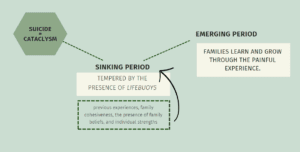Context :
Family members of a person who has died by suicide are at an increased risk of experiencing depression, post-traumatic stress disorder, suicide ideation, and suicide. However, despite the experience of losing a family member to suicide, most families continue to function and even live well following this difficult experience.
Objective:
This study sought to understand and describe the transformation process that occurs in family member survivors using a grounded theory approach.
Methods
- Grounded theory suggests that social actors are the only ones who can indicate to the researcher the meaning they give to the social world around them, and that knowledge develops inductively.
- This approach is useful in nursing, as it allows the development of an explanatory theory of human behavior in a particular context.
- Seven families, who experienced the loss of an adolescent in their family by suicide, participated in this qualitative study.
Results & Discussion
The results describe the transformation process experienced by the family. Even if the suicide of an adolescent is a shocking event, the fact remains that families can also go through a process of growth, which could be identified as emerging despite the indelible wound.
According to the grounded theory developed in this study, the suicide is a cataclysm, followed by a sinking period that is tempered by the presence of lifebuoys, which are supports that can be found within the families or from people around them. A period of emergence follows in which the family takes action to bounce back. That being said, it is necessary for family nurses to understand this transformation process to better support surviving family members and improve suicide postvention care.

The results of this study are consistent with the literature on suicide bereavement. The emotions expressed by the participants in this study are similar to those mentioned in previous research such as surprise, sadness, guilt, and anger. However, an important finding in this study is that family members sometimes felt angry at professionals, such as nurses, who were not able to help the adolescent before their death. This anger could impair the therapeutic relationship that is essential to healing. It is important for nurses not to feel threatened by this anger, which is not directed at them personally.
The contribution of this research to the literature is that it studied not only the negative impact of the suicide, but also the positive transformation it can bring. Similar to Moore et al. (2015), this study found that post-traumatic growth is possible following adolescent suicide. The description of how this growth happened reveals that the process takes time, sometimes months or even years. The families in this study reported positive changes on different levels: individual, family unit, and in their overall outlook on life.
Authors : Christine Genest , Francine Gratton , Tara O’Reilly , Émilie Allard , Nathalie Maltais (2021)
Click here for full article: https://pubmed.ncbi.nlm.nih.gov/33855903/